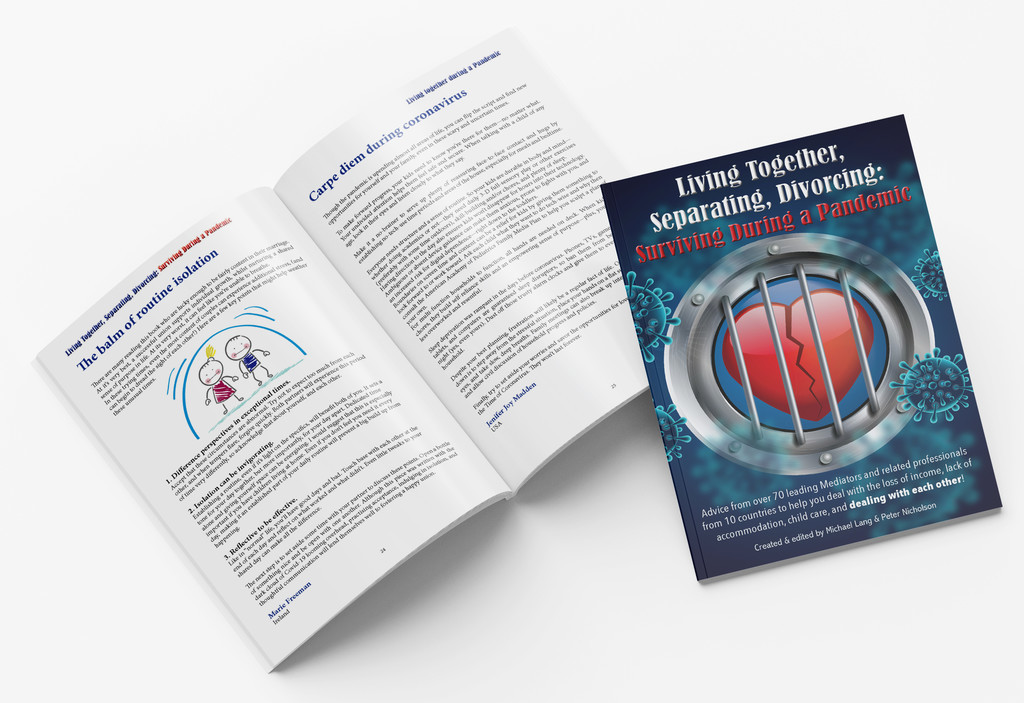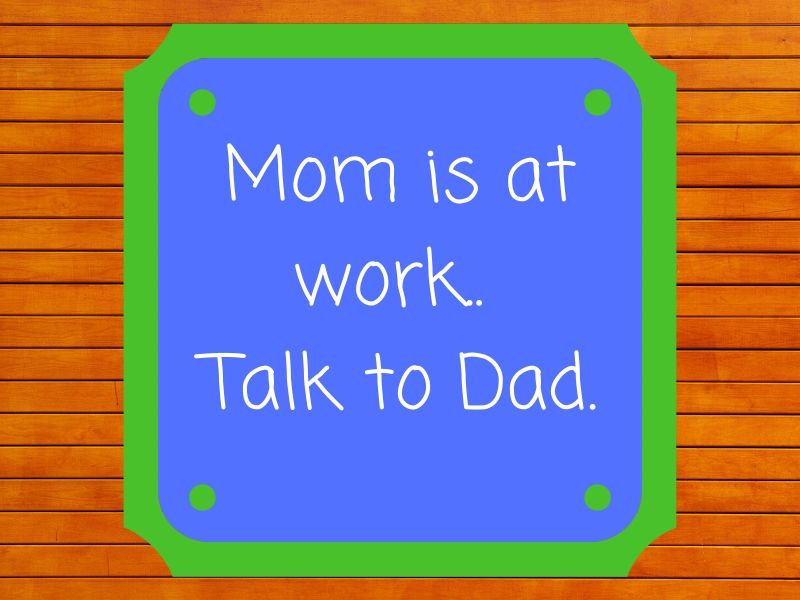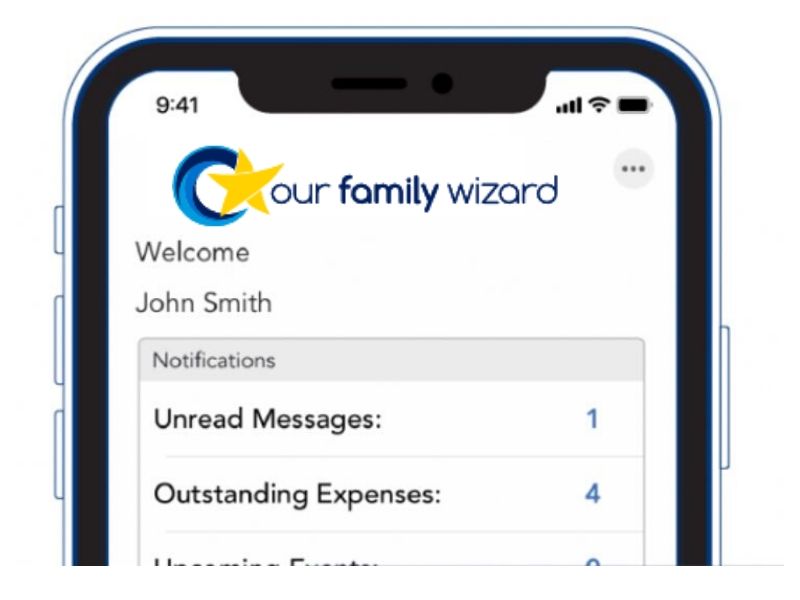
When the coronavirus shuttered the world, couples and families froze in place. For some, it was an unexpected opportunity to reconnect. Others felt trapped, especially those already in distress and thinking of splitting up. To help them, relationships experts from around the world rushed to create Living Together, Separating, and Divorcing: Surviving a Pandemic.
American family mediator Michael Lang and Irish book publisher Peter Nicholson wanted to “help families strained by forced confinement and shoved suddenly into reconfiguring their lives by the impact of COVID-19,” says Lang. So he put out the call. “It took about twenty minutes after he sent out a few emails before we got our answer,” according to Nicholson. “Leading mediators and related professionals stepped up to the challenge.”
After more than seventy experts quickly submitted their gratis advice, the book was compiled and published in only three weeks. The e-book is priced at $1.99, the lowest cost allowed by Amazon.

Start with Yourself
Coping with the crisis begins with you. Above all, writes U.S. psychologist and mediator Arnie Sheinvold, “treat yourself kindly.”
To keep your mind, body, and relationships durable, you need the basics of good nutrition, physical activity, and solid sleep. “By taking care of your own needs, you can ensure that you are in the best possible place to take care of your family during this emotional time,” says U.K. parenting advisor and author, Sue Atkins.
Keep tabs, also, on your thoughts and actions. While you may not be able to control what’s happening around you, you can manage your own response. “Don’t be reactive,” writes U.S. psychologist and mediator, Arnie Sheinvold. If you take a breath and remain calm, it’s more likely the family ship won’t capsize in stormy seas.
Canadian family mediator Mary-Anne Popescu finds inspiration from a refrigerator magnet with the words “Conflict is inevitable. Combat is optional.”

“You are an expert in predicting what will cause tense situations, and what you can now become is an expert in deciding how you will handle it,” Popescu writes.
Engage Peacefully
Establishing rules of engagement is very important. Devika Sammy, a mediator from Trinidad, suggests you find a private, comfortable place for discussions and set a time limit. Think ahead to prioritize issues and write them down so you don’t forget. Consider the tone you will take and “reframe the harsh words.”
For when you or your partner can sense an argument is escalating, agree on how to call a time out. “When one of you uses the pause phrase, the discussion ends for now; even a few minutes’ break can help. A pause word or phrase might be, ‘I’m calling pause,’” advises American conflict resolution teacher and mediator, Tammy Lenski.
Try not to one-up the other party, especially at the end of a discussion. As Lenski says, “If you’ve got to have the last word, try to make it one that conveys you ‘get’ your conversation partner.”
Many advisers shared the same advice as David Gray, a mediator from Ireland: “Keep arguments away from small ears.”
Canadian mediator Hilary Linton explained why through this quote from Justice Marvin Kurz of the Ontario Superior Court:
Putting children in the middle of conflict, demonstrating that fighting and arguing is how adults manage their disputes, making children take sides in a lose-lose game, all corrode a child’s emotional equilibrium.
Look Them in the Eye
As I write in the book, your kids need to know you’re there for them—no matter what. Having your undivided attention makes them feel safe and secure. That’s why, when talking with a child of any age, look in their eyes and listen closely to what they say. Ensure plenty of face-to-face contact and hugs by having time periods and areas of your home where you put away attention-stealing phones and other digital devices, especially during meals and at bedtime.
Especially in households where couples plan separation or are already divorced, U.S. mediator Virginia Colin agrees space management is key: “Regardless of how small your apartment is, you need to make sure that each parent has an entirely private space they can return to when they need to rest and recharge their psychic or physical energies.”
Make a plan to share tasks and responsibilities. “Each of you should have some scheduled turns as the default parent,” Colin adds. “To help the kids with the schedule, you can have a sign on your shared office door. One side can say ‘Mom is at work. Talk to Dad. The other can say ‘Dad is at work. Talk to Mom.’” Watch Virginia’s Relationship SOS presentation here.

Ask the Experts
Despite your best efforts, you may need outside help to achieve success. Family mediators are neutral parties who work with couples to manage conflict and solve problems. Find one through the Academy of Professional Mediators. A Certified Divorce Financial Analyst (CDFA) can help you assess your money situation and meet financial goals.
If you think you can’t afford an expert, take a tip from Ellice Halpern, an American family mediator and lawyer: “Ask for a no charge consult before you commit to working with and paying a CDFA, mediator, lawyer, accountant, and/or therapist. You want to make sure that all of the advisors who you are hiring will be a good fit and will be affordable.” Watch Ellice’s Relationship SOS presentation here.
Sometimes, the situation is so acrimonious, the only way parties can communicate is through writing, and even that can get nasty.
Our Family Wizard was recommended more than once. The app keeps co-parents on the same page through a shared calendar, storage for documents and expense records, and a messaging system.
I especially love the durable human design of the app’s ToneMeter™ which detects words that may be aggressive, humiliating, or upsetting. “It won’t keep them from sending a message,” product liaison and lawyer Danielle Kestenbaum told me. “But it’s a reminder to the person composing the message and will analyze and ding that.”

Virginia Colin, Ellice Halpern, Michael Lang, and I teamed up to present Relationship SOS, a free webinar where we gave a quick rundown of our book contributions and answered questions.
WATCH THE FULL RELATIONSHIP SOS WEBINAR HERE
Thinking over the whole book, the biggest payoff for reading Living Together, Separating, and Divorcing: Surviving a Pandemic may be to realize that, even if you’re physically frozen in place, you can still move forward.
WATCH MY RELATIONSHIP SOS 7-minute PRESENTATION HERE: “Carpe Diem During Coronavirus”
About the author:
Jenifer Joy Madden is a parent educator and adjunct professor of broadcast and digital journalism at Syracuse University. She founded DurableHuman.com and wrote How To Be a Durable Human: Revive and Thrive in the Digital Age Through the Power of Self-Design.



